A REVITALIZAÇÃO DE ÁREAS HISTÓRICAS COMO ESTRATÉGIA DE DESENVOLVIMENTO LOCAL: AVALIAÇÃO DO CASO DO BAIRRO DO RECIFE¹
DOI:
https://doi.org/10.61673/ren.1999.1841Keywords:
Urban revitalization, Municipal development, Local economical policy, Recife, Urbanization, Historical Center, Pernambuco, BrazilAbstract
The objective of this work is to evaluate the performance of the implementation process of the “Pólo do Bom Jesus” as the project of the Revitalisation Plan of the Recife Neighbourhood during the period of 1993-1996. This Plan constitutes important experience in building a municipal development strategy in Brazil. Specifically, the work tries to show the response of the private sector (real state owners of degraded urban areas) to the actions taken by the Municipality to implement the Plan. The main conclusion of the work is that the “Pólo do Bom Jesus” project presented positive results in relation to the expectations formulated before the beginning of the plan implementation process. The main outcome was to demonstrate that the historic urban areas are not “dead” in economical terms. There is a large development potential that can be activated if the Municipalities start to work articulated with the private sector to revitalise this type of urban areas.








